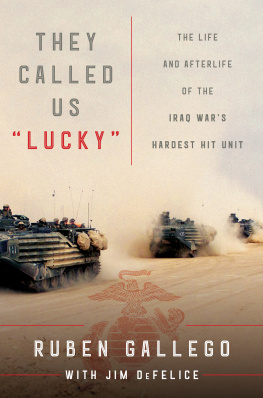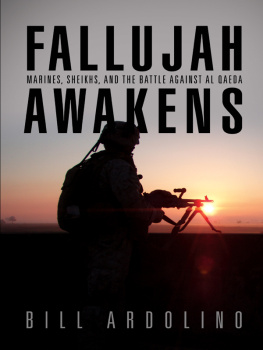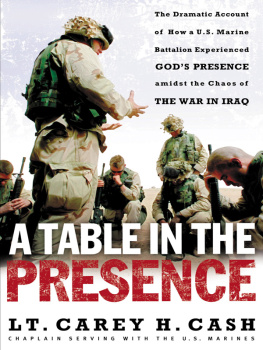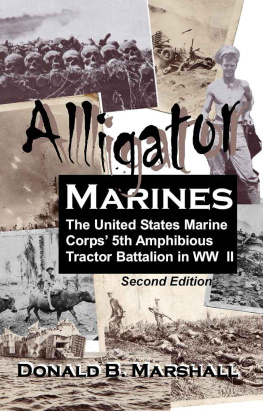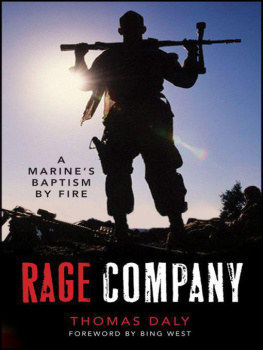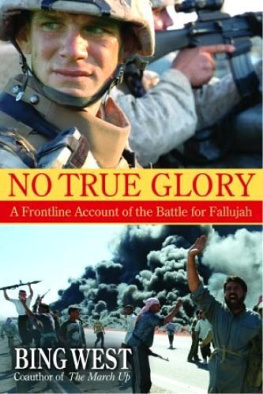I N THE LATE SUMMER OF 2006, MEMBERS OF THE 2ND B ATTALION of the 3rd Marine Regiment (abbreviated 2/3 and pronounced two-three)the Island Warriorssaid goodbye to their families, friends, and home base at Kaneohe Bay, Hawaii, and embarked on a journey to the other side of the world. Days later, they arrived at their destination: the Haditha Triad region of western Iraq. The Triad, a geographic term coined by the Marine Corps, consisted of the city of Haditha and a number of surrounding towns and villages, notably Barwana, Haqlaniyah, and Albu Hyatt. Located at a strategically critical point on the Euphrates River corridor between the Syrian border and the cities of Fallujah and Ramadi, the Triad ranked as one of the most vital locations for the group known as Al Qaeda in Iraq (AQI) and its affiliates throughout Operation Iraqi Freedom (OIF). Far from the countrys large cities and surrounded by vast sweeps of desolate, uninhabited desert, Haditha and its satellite towns lay in the heart of the countrys Al Anbar Province, AQIs base of operations and lifeline throughout the war.
The battalion arrived in the Triad well into the wars fourth year. Since the March 20, 2003, official kickoff of Operation Iraqi Freedom, the nature of the conflict had progressed from a blunt shock and awe fight to a complex, highly nuanced counterinsurgency campaign piqued by hard kinetic regional thrusts and smaller surgical counterterror strikes. 2/3s overarching goal for its seven-month tour: improve security for the local inhabitants of the war-ravaged Triad by decimating outside AQI influence while simultaneously supporting a resurgent local government and economy. It would continue the work of previous Marine Corps battalions that had rotated through the Triad, notably its sister battalion, the 3rd Battalion of the 3rd Marine Regiment, which 2/3 relieved-in-place upon its arrival in late summer 2006.
Despite steadfast progress by 3/3 and previous units, 2/3 arrived exactly at a critical moment in the war, when unforeseen circumstances created nearly insurmountable consequences. As components of the 1,100-strong battalion task force settled into their respective areas of operation throughout the region, key events, conditions, and factors coalesced to foment an enduring hurricane of adversity, violence, and calamity.
Al Qaeda in Iraq, eviscerated from blow after blow in key strongholds like Fallujah and Ramadi, fell back to the Triad, assuming the posture of a cornered, mortally wounded animal. Overlooked by global media, the region had served as a relative sanctuary where AQI could thrive and grow over the course of Operation Iraqi Freedom. But, with nowhere else to flee to and ravage, AQI transformed the Triad into a theater for its last, desperate gasps for survival just as 2/3 arrived.
Yet the terrorists of Al Qaeda in Iraq didnt lash out against the battalion in large, concerted efforts. The enemy hid among the locals they terrorized and had threatened into submission and silence. They melted into the beaten populace and under and among the shadows of the labyrinthine alleyways and back streets of the city. Then they struckknowing that members of the battalion could rarely hit back with their traditionally overwhelming force because the Marines of 2/3 held the safety of the locals as their highest priority.
AQI attacked with sniper fire, with volleys of mortars and rockets, with tossed hand grenades, with complex ambushes from well-concealed positions, and, perhaps most insidiously, with improvised explosive devices, or IEDshidden bombs detonated remotely or by triggers hidden in roads, trails, even open desert ground. In its drastic attempts to derail the nascent post-invasion Iraqi government, AQI indiscriminately killed and maimed innocent local men, women, children, Iraqi national forces, and, of course, members of 2/3, who had come to fight for the Iraqi people and their countrys security and growth.
Forged in the fire of recent combat, having acquired a half year of intensive, specialized training before the deployment, and led by mission-focused, dedicated officers, 2/3 immediately charged ahead with its assignment. But the circumstances proved more complex than any before experienced in the war in Iraq. The phantom enemy threw everything it had at the battalion and simultaneously sought to drive wedges between the locals and 2/3, directly, through threats and intimidation, and indirectly, through carefully coordinated information operations. The enemy proved relentless and brutal. Within the first weeks of the battalions arrival, AQI had killed many and wounded dozens of members in horrific, bloody attacks. Further complicating the fight, 2/3s higher command, located miles distant from the Triad, hammered the battalion with burdensome restrictions thatwere it not for the unrelenting drive of 2/3s senior leadershipwould have crippled it to the point of defeat at the hands of the enemy.
For all members of the 2nd Battalion of the 3rd Marine Regiment, their Iraq tour would prove the toughest, most brutal fight of their livesarguably the toughest, most brutal fight experienced in modern war. Despite the circumstances, despite the viciousness of an enemy desperately striking them and the local populace, despite the losses, despite the absolute necessity of restraint, and despite the crushing demands of their higher command, the members of the battalion would ultimately see their toil and sacrifice yield successabsolute, unmitigated victory. They accomplished this through discipline, dedication, resiliency, creativity, and classic, time-honed Marine Corps warfighting prowess: in their counterinsurgency campaign, they held protecting the locals and rebuilding the government, security forces, and economy as their highest duty.
Far beyond simply stating these intentions, their actions proved their resolve to the people of the Triad, winning their steadfast allegiance over any obedience coerced by AQI. When moments demanded caution in the face of potential harm or loss of innocent Iraqi life, they kept their trigger fingers straight. When moments demanded action, they struck swiftly and decisively. From the second they set foot in the Triad till the moment they had the area to their backs on their way home, they acted with utmost determination and fidelity to mission, to the Iraqi people, and to each other, even in the darkest of hoursand each and every member of the battalion experienced some of the bleakest, most horrifying of these moments during this tour. Their fightunlike any otherrepresents one of the greatest untold stories of surmounting overwhelming adversity to achieve victory in modern war, one completely overlooked by history.
This book chronicles this incredible chapter of modern military history by weaving together the most salient and emblematic components of 2/3s deployment to the Triad through the progression of their time therestories of bravery, sacrifice, incredible hardship, horror, and ultimate victory.



